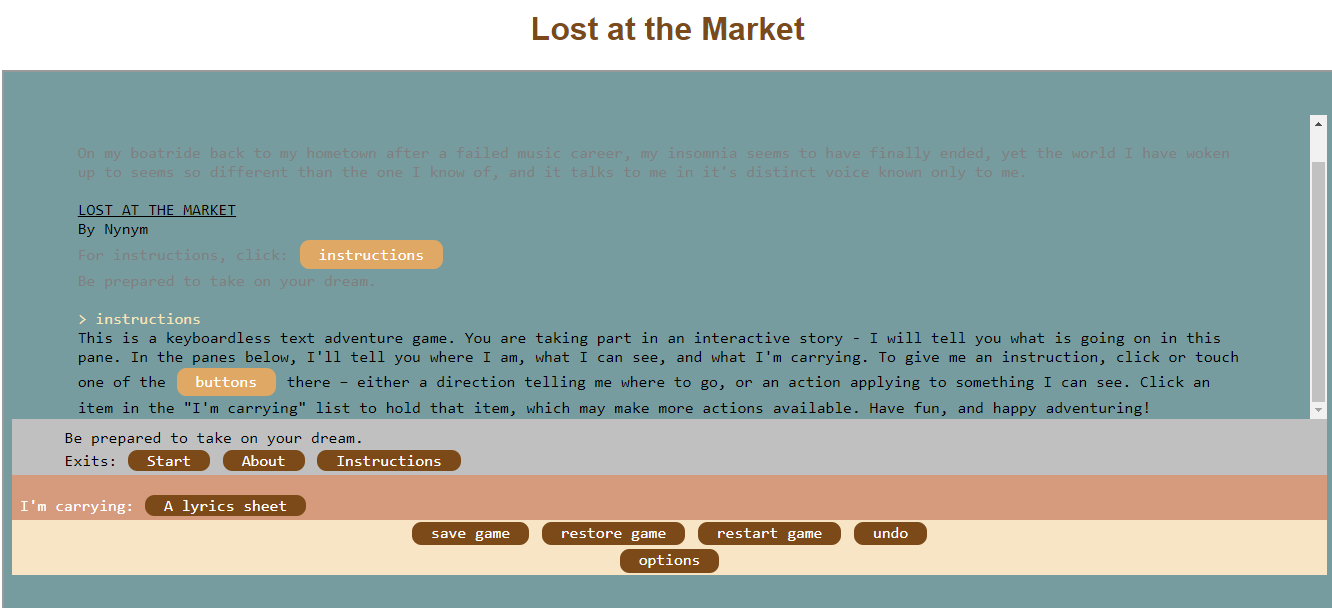Lost at the Market by Nynym
I have a rather melancholic temperament-- at least that is how I perceive myself-- and so it’s easy for me to be drawn into works that explore topics like regret, pursuing one’s passions, and how we adapt as we embark on new phases in our lives. Lost at the Market certainly fits this description, a short peek into a slice of one of these transits.
First, some thoughts on the look and feel of the layout. The game’s interface is web-based, and the interface is presented on a pleasant and complementary color palette of pastels. Options are offered to change display preferences, such as font face and size, as well as options for how the current room and objects are displayed. For my playthrough, I opted to use the default display settings.
The upper third of the interface is a scroller that displays the commands issued at the prompt and their results, as well as room and object descriptions. The most recent command issued and its result is displayed on the bottom of this pane in black text, and previous commands proceed chronologically backwards in an upward direction with that text shown in gray. In my web browser, the latest version of Chrome as of this writing (version 107), the choice of gray text on the shade of sea green used as the background made it a little difficult at times to legibly read previous history. The following screenshot only shows the initial introduction and the instructions printed out:
The middle section contains a few horizontal bars with an assortment of buttons, used to interact with inventory, room objects, people, and movement options, as well as commands to save, restore, restart, undo, and viewing display options.
I was pleasantly surprised by the simplicity of the interface and what it afforded me during my gameplay. The way that the actions on things in the world were displayed made a lot of sense to me. I did appreciate that organizing the interface in this way allowed me to better immerse myself within this particular story and experience. I think this is largely due to the simplicity and limited selection of the actions that can be performed on the objects of this world. The same goes for the puzzles in this game, which are simple and few. I found it natural and easy to just focus on the message and experience of the game. I was able to complete Lost at the Market in about 20 minutes in my playthrough.
As for the central theme and message of the game, I certainly would count myself among those people who often reminisces and reflects on the various decisions I’ve made over the course of my life, from the portentous to the mundane. Regret can sometimes be a fickle subject, sometimes accompanied by platitudes of self-assurance, “Live with no regrets!” The reality is-- speaking strictly for myself-- that I do willingly carry varying degrees of regret and will choose to continue to do so. The most important part of my decision lies within how I decide to press on while I carry and hold my own previous experiences. The way Lost at the Market left me by the end of the game was a comforting mirror reflection of the same inevitable, ongoing challenge and confrontation in how I choose to take my own steps forward in the present day, the present moment. It’s a simple and familiar message, and Lost at the Market expresses this inevitability in a nice and compact way.
There’s one line in particular in the author’s walkthrough text after I had finished that really spoke to me and my inner being: Sometimes words are hard to find, the thing we want to say never quite reach, but every piece is written with the hope that someday they will. I often tussle and anguish over the words I write. Perhaps it’s lack of practice, perhaps it’s a reflection of making sure that I say things on my own terms and making sure I get that right. Perhaps it’s both of these and more. Whatever the case is, Lost at the Market reminds me that I always have the option in the present to search and find those words. Ultimately, I was pleased with this short choice-based experience.
